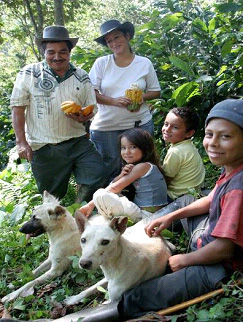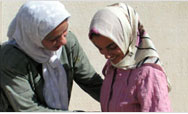You are here » Home » Telling Our Story
Success Story
Small farmers become entrepreneurs
Farmers Learn to Plant New Crops

| |
Photo: Chemonics
|
|
Jairo Palacios and his wife hold cacao that will be sold to provide for their children’s future.
“The most important thing in life is peace. I’ve managed to find that for myself and my family by giving up illicit crops and participating in the program,” said Jairo Palacios.
|
In many parts of rural Colombia small farmers often struggle to make a living from traditional crops. As a result, many tur
n to illegal coca production. The presence of illicit crops brings violence and illegal armed groups into rural communities. Jairo Palacios was one of these farmers, until he found out there was an alternative.
Like many others, Palacios first abandoned coca production as part of a government program that provided a three-year, subsidy of $4,800 to farmers for halting coca production. Instead of spending the subsidies on consumer goods, many farmers began looking for ways to invest their money in viable long-term projects. To help them, USAID funded a four-phase program to assist farmers in developing sustainable, long-term production capabilities.
Under the program, farmers first join regional study tours where they observe successful models of existing rubber and cacao plantations. These crops can be profitably produced on small plots of land like Palacio’s. Second, they plant demonstration parcels, gaining hands-on experience with the new crops. Third, private investors partner with them to develop 1,000 hectare plantations of cacao and rubber. The small farmers invest their subsidy, their land, and labor, and the private-sector investors provide technical assistance and marketing outlets. Finally, farmers learn how to form producers’ associations to manage the crops and market their produce. These associations help farmers demand a fair price. As a result, by December 2005, 642 farmers had been trained to plant and maintain cacao and rubber plantations, and 11 producer associations had been formed.
Surveying his cacao and coffee bean crops, Jairo Palacios commented on the program’s appeal, “The most important thing in life is peace. I’ve managed to find that for myself and my family by giving up illicit crops and participating in the program.” Instead of worrying about his children’s safety, Jairo can now plan for the future. “Now I can offer my children a safe and real future. Hopefully the money I can make with my new crops will allow them to go to college,” he said with a smile.
Print-friendly version of this page (400kb - PDF)
Click here for high-res photo
Back to Top ^ | 

